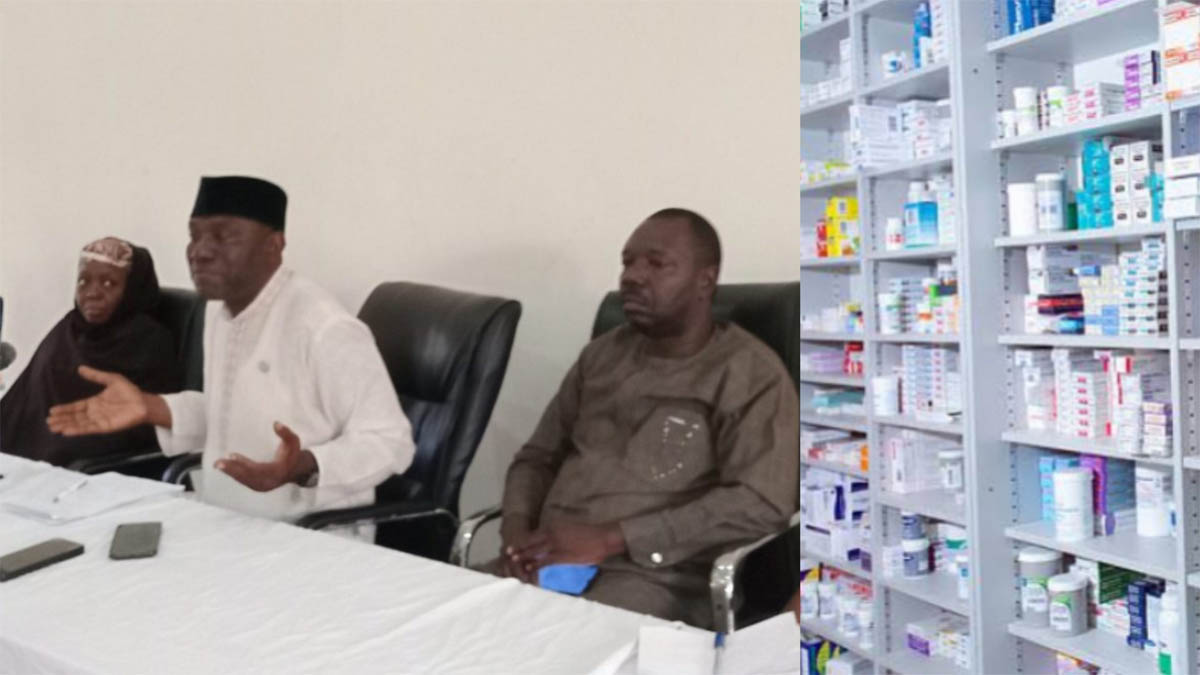Health
666 medicine shops shut down in Kaduna

666 medicine shops shut down in Kaduna
The Pharmacy Council of Nigeria (PCN) has shut down 666 illegal medicine shops in Kaduna State for operating illegally and violating National Drug Distribution Guidelines.
The enforcement exercise, which began earlier in the week, targeted open drug markets and other locations across the state, where medicines were being sold without proper registration and supervision.
The move aims to ensure the safe and effective distribution of medicines, protect public health, and prevent the sale of harmful substances in the state.
Addressing a press conference after the end of the exercise in Kaduna on Thursday, PCN Director of Enforcement, Pharm. Stephen Esumobi said the affected premises included 47 pharmacies, 313 patent medicine shops, and 306 illegal medicine shops.
Esumobi noted that the PCN team visited 895 premises during the exercise, issuing 9 compliance directives to owners of shops found to be operating illegally.
According to him, medicine shops were sealed for offences ranging from the sale of medicines in the open drug market, operating without registration with the Pharmacy Council of Nigeria, Poor documentation, Poor storage facilities, and Stocking of Ethical products without the supervision of a pharmacist.
“The PCN will not tolerate the sale of medicines in open drug markets and other unregistered locations,” Esumobi said while adding that “we will continue to enforce the National Drug Distribution Guidelines to protect public health and prevent the sale of harmful substances.”
He added the medicine shops in open drug markets and some other locations across Kaduna state were not registered by the Pharmacy Council and are operating illegally.
READ ALSO:
- Tinubu visits King Charles at Buckingham Palace
- NAF airstrike kills 28 terrorists in Niger State
- Fire razes Kogi phone market, goods worth millions lost
The development, he argued, posed a great danger to public health because storage conditions of medicines in such premises were at variance with manufacturers’ recommendations.
“The implication of this is that most of the medicines sold in these locations may no longer be fit for human consumption due to degradation of the active ingredients,” he said.
Esumobi warned that the PCN would not hesitate to take further action against erring medicine dealers, adding that the council would assist owners of sealed shops who were willing to comply with regulations.
He said, ”The Pharmacy Council of Nigeria (PC) is the Federal Government Parastatal charged with the responsibility of regulating and controlling the education, training and practice of pharmacy in all its aspects and ramifications in line with the Pharmacy Council of Nigeria Establishment Act 2022.
“One major obstacle militating against the quality, safety and efficacy of medicines in Nigeria is the sale of medicines in open drug markets.
“The PCN had communicated severally with the relevant stakeholders in the state including the medicine dealers in open drug markets in Zaria and Kaduna city on the need to relocate to registrable locations or a coordinated wholesale centre as their activities are in total violation of the National Drug
Distribution Guidelines.”
He added that “at the end of the enforcement exercise which began early this week, a total of eight hundred and ninety-five (895) premises were visited. This is made up of seventy-five (75) pharmacies, five hundred and fourteen (514) Patent medicine shops and three hundred and six (306) illegal premises.
“A total of six hundred and sixty-six (666) premises were sealed. The premises sealed include forty-seven (47) pharmacies, three hundred and thirteen (313) Patent medicine shops and three hundred and six (306) illegal medicine shops.
“The PC office in Kaduna will render all necessary assistance to owners of sealed shops who are willing to comply with regulations.”
666 medicine shops shut down in Kaduna
Health
Ramadan Health Tips: Six Ways to Stay Hydrated While Fasting

Ramadan Health Tips: Six Ways to Stay Hydrated While Fasting
Staying hydrated during Ramadan is essential for maintaining energy, focus, and overall well-being while observing long hours of fasting. Health experts warn that poor hydration can lead to fatigue, headaches, dizziness, and reduced concentration. Below are six essential, numbered tips to help you stay properly hydrated throughout the holy month:
1. Drink Enough Water Between Iftar and Suhoor
Ensure you consume 6–8 glasses of water between Iftar and Suhoor. Spread your intake gradually instead of drinking large amounts at once, allowing your body to absorb fluids effectively.
2. Break Your Fast With Water
Start Iftar with water to quickly replace fluids lost during the day and prepare your digestive system for food. Avoid sugary or carbonated drinks at this stage, as they can increase thirst later.
READ ALSO:
- Tinubu Urges Senate to Confirm Yusuf for NAHCON, Marafa for INEC
- Galatasaray Stun Juventus 5–2 in UEFA Champions League
- Vinicius Jr’s Wonder Goal Gives Real Madrid Victory Over Benfica
3. Eat Water-Rich Foods
Include fruits and vegetables with high water content, such as watermelon, oranges, cucumbers, tomatoes, lettuce, and soups. These foods support hydration while providing essential nutrients.
4. Reduce Salty, Spicy, and Fried Foods
Limit foods high in salt, oil, and spices, especially at Suhoor, as they increase thirst and can cause dehydration during fasting hours.
5. Limit Caffeine Intake
Reduce consumption of coffee, tea, and energy drinks, as caffeine has a diuretic effect that causes the body to lose more fluids. If taken, balance it with extra water.
6. Never Skip Suhoor
Suhoor plays a crucial role in hydration and energy. Eat a balanced pre-dawn meal that includes water, fruits, vegetables, whole grains, and protein to help sustain you throughout the day.
Maintaining proper hydration during Ramadan fasting helps support digestion, boosts energy levels, and keeps the body functioning optimally throughout the holy month.
Ramadan Health Tips: Six Ways to Stay Hydrated While Fasting
Health
NUFBTE Workers Occupy NAFDAC Lagos Office Over Sachet Alcohol Ban

NUFBTE Workers Occupy NAFDAC Lagos Office Over Sachet Alcohol Ban
Members of the National Union of Food, Beverage and Tobacco Employees (NUFBTE) on Thursday staged a protest at the NAFDAC office in Isolo, Lagos, demanding the reversal of the agency’s ban on sachet and PET-bottled alcoholic beverages. The union claims the ban contradicts a directive reportedly issued by the Federal Government, and they want production lines that were sealed to be immediately reopened.
The protesters, including manufacturers, distributors, and industry workers, argued that the enforcement of the ban threatens jobs, livelihoods, and the operations of small and medium-sized enterprises that rely on sachet alcohol sales. During the demonstration, union members handed a petition to NAFDAC officials, urging dialogue and a more balanced approach that safeguards both public health and the food and beverage sector.
NUFBTE cited alleged instructions from the Office of the Secretary to the Government of the Federation and the Office of the National Security Adviser, claiming that NAFDAC should suspend enforcement. The union said continued closure of production lines and restriction of alcohol sales would lead to economic hardship and widespread job losses.
READ ALSO:
- Naira Could Trade Below ₦1,000/$ With Dangote Refinery at Full Capacity — Otedola
- Adeyanju Urges EFCC, DSS to Probe El-Rufai Over Alleged Corruption, Insecurity in Kaduna
- Granite-Laden Truck Kills Motorist, Leaves Wife Critically Injured in Lekki–Ajah Crash
However, NAFDAC rejected the claims, with Director-General Prof. Mojisola Adeyeye stating that no federal directive has instructed the agency to halt the ban. In a statement, the regulator described circulating reports as “false” and “misleading,” emphasizing that its actions are within statutory authority and in line with official government policies.
“NAFDAC has not received any formal directive to suspend its regulatory or enforcement activities concerning sachet alcohol,” the statement read. The agency reiterated its commitment to public health protection, regulatory compliance, and consumer safety, warning the public and industry stakeholders to rely on verified information from official channels.
The ban, implemented earlier this month, targets alcoholic beverages packaged in sachets and containers smaller than 200ml, a measure aimed at reducing unregulated alcohol consumption and protecting vulnerable groups. While the policy has faced backlash from workers and businesses, NAFDAC maintains that it is necessary for national health and safety.
The protest underscores the tension between regulatory enforcement and economic concerns, as workers continue to call for inclusive policymaking and engagement with industry stakeholders to mitigate the impact on jobs and local businesses.
NUFBTE Workers Occupy NAFDAC Lagos Office Over Sachet Alcohol Ban
Health
NAFDAC Clarifies: No Government Directive to Halt Sachet Alcohol Enforcement

NAFDAC Clarifies: No Government Directive to Halt Sachet Alcohol Enforcement
The National Agency for Food and Drug Administration and Control (NAFDAC) has dismissed reports claiming that the Federal Government ordered a suspension of its enforcement activities against sachet alcohol and 200ml PET bottle alcoholic beverages, describing the reports as “false and misleading.”
In a statement signed by its Director-General, Prof. Mojisola Adeyeye, the agency clarified that it has not received any formal communication from the Federal Government instructing it to halt regulatory or enforcement operations. NAFDAC stressed that all its actions are carried out within its statutory mandate and guided by existing laws and official government directives.
“The said publication is false, misleading, and does not reflect any official communication received by the Agency from the Federal Government,” the statement read. Prof. Adeyeye reiterated that enforcement of regulations on sachet alcohol remains active and any changes to national regulatory policies would be officially communicated through authorised channels.
READ ALSO:
- Suspected IED Explosion Rocks Bayelsa Secretariat, Police Arrest Suspect
- Regina Daniels Shares Emotional Message on Children’s Welfare Amid Custody Battle
- Electricity Workers Serve 21-Day Nationwide Strike Notice to FG
NAFDAC warned that the spread of unverified information can cause public confusion, economic uncertainty, and misinterpretation of government policy. The agency urged the public, industry stakeholders, and the media to rely only on verified information released via its official platforms and government communication channels.
The clarification comes amid ongoing concerns over the public health risks of sachet alcohol, which has been associated with poisoning incidents and misuse, particularly among young people. NAFDAC reiterated its commitment to protecting public health, ensuring compliance in the food and beverage sector, and maintaining national interest while carrying out its regulatory duties.
The agency’s statement underscores that all enforcement operations targeting unsafe alcohol products will continue without interruption, aiming to safeguard consumers and uphold public safety.
NAFDAC Clarifies: No Government Directive to Halt Sachet Alcohol Enforcement
-

 News3 days ago
News3 days agoSaudi Arabia Confirms Sighting of Ramadan Crescent, Fasting Begins Wednesday
-

 metro3 days ago
metro3 days agoLagos Woman Shares Ordeal After Alleged Rape, Sparks Nationwide Outcry
-

 News3 days ago
News3 days agoRamadan Begins in Nigeria as Sultan Confirms Crescent Sighting
-

 International22 hours ago
International22 hours agoCanada Opens New Express Entry Draw for Nigerian Workers, Others
-

 metro3 days ago
metro3 days agoSeven Killed in Horrific Crash at Ota Toll Gate
-

 News2 days ago
News2 days agoKorope Drivers Shut Down Lekki–Epe Expressway Over Lagos Ban (Video)
-

 Health2 days ago
Health2 days agoRamadan Health Tips: Six Ways to Stay Hydrated While Fasting
-

 metro21 hours ago
metro21 hours agoOsun Awards 55.6km Iwo–Osogbo–Ibadan Road Project to Three Contractors















